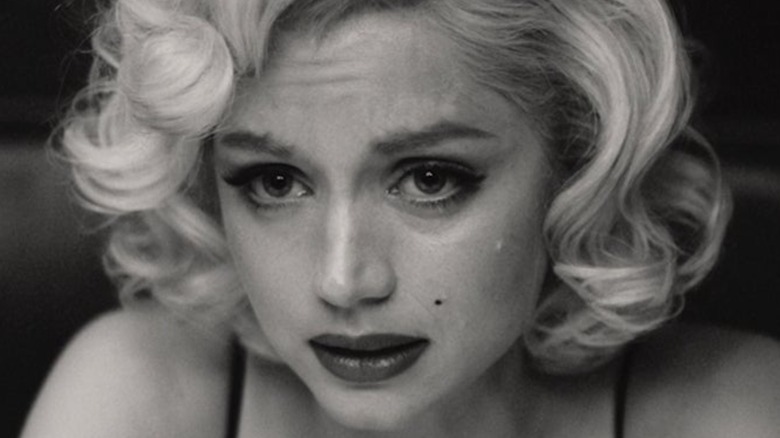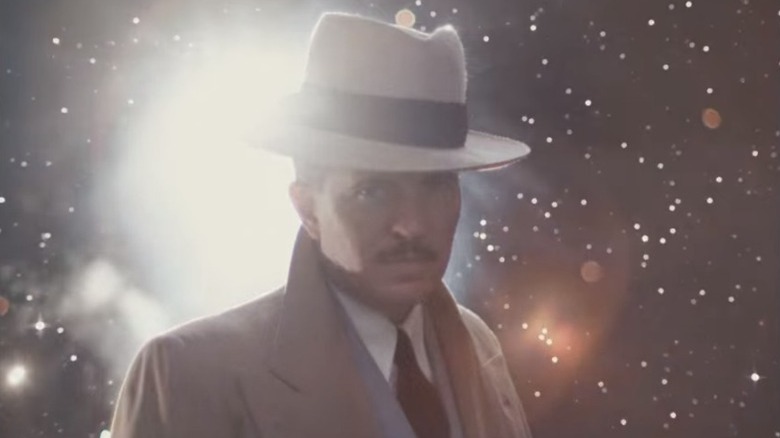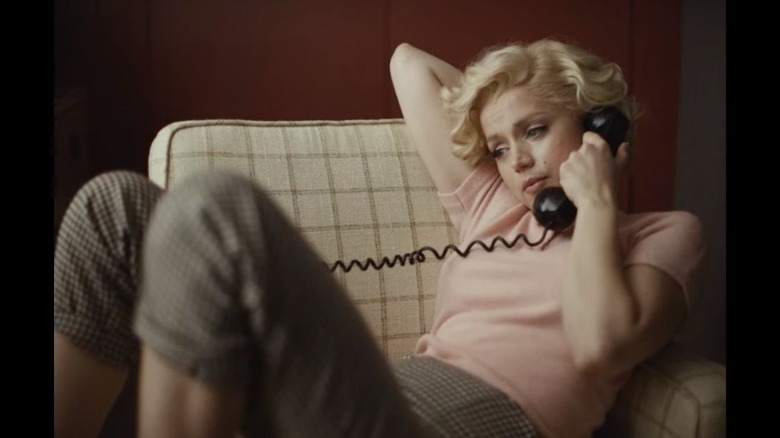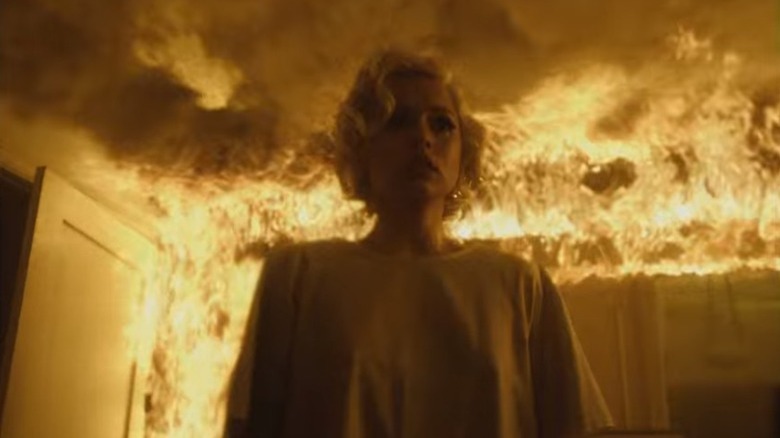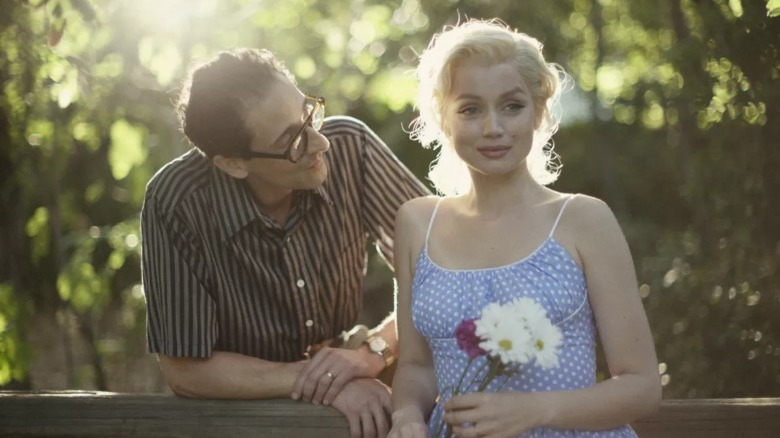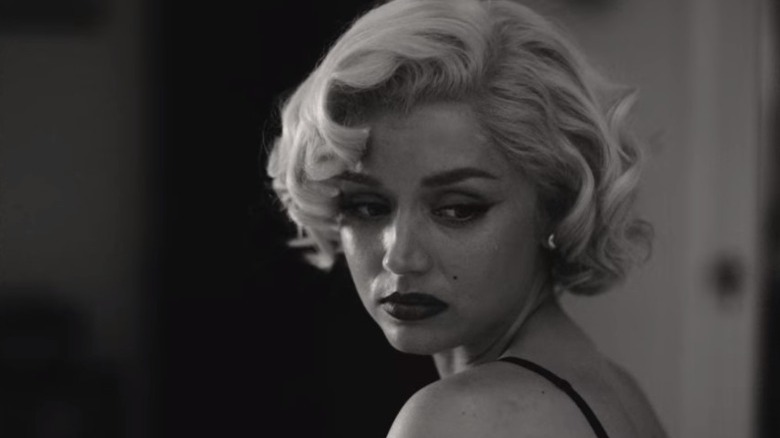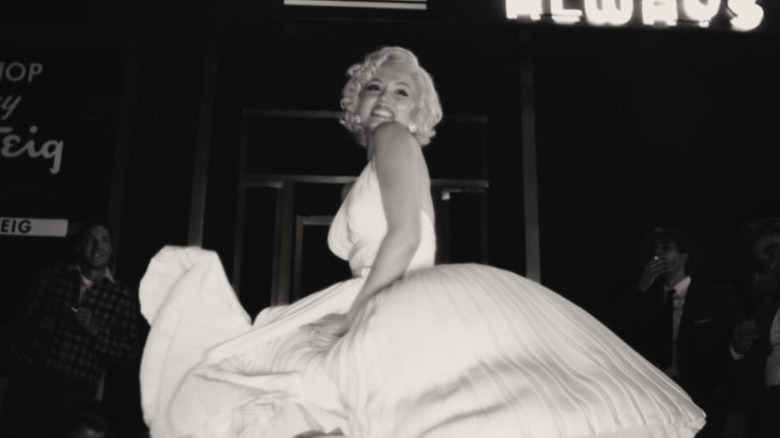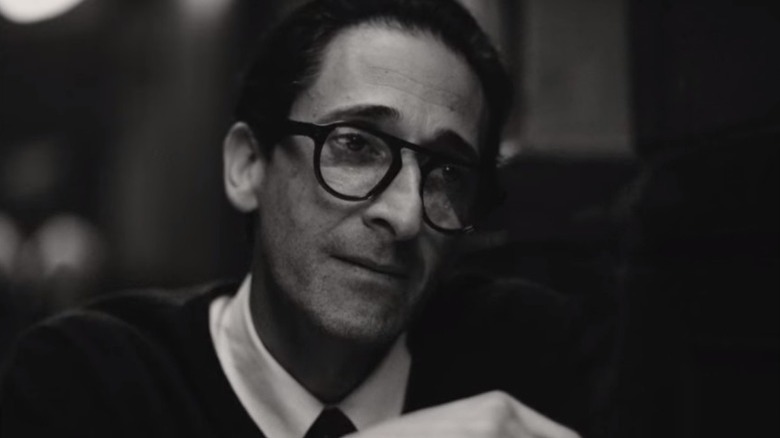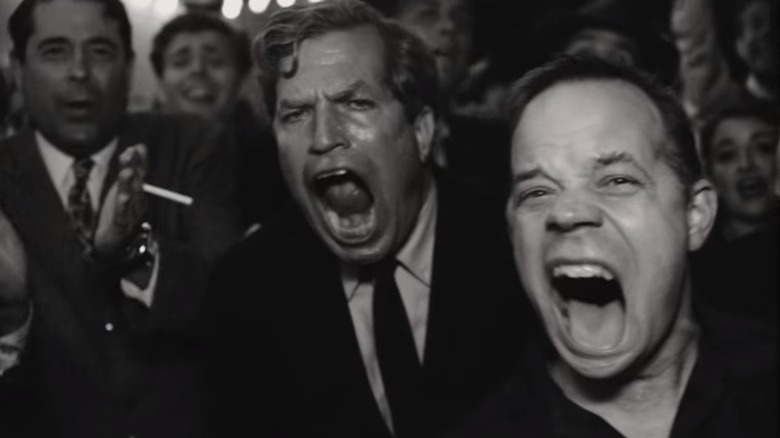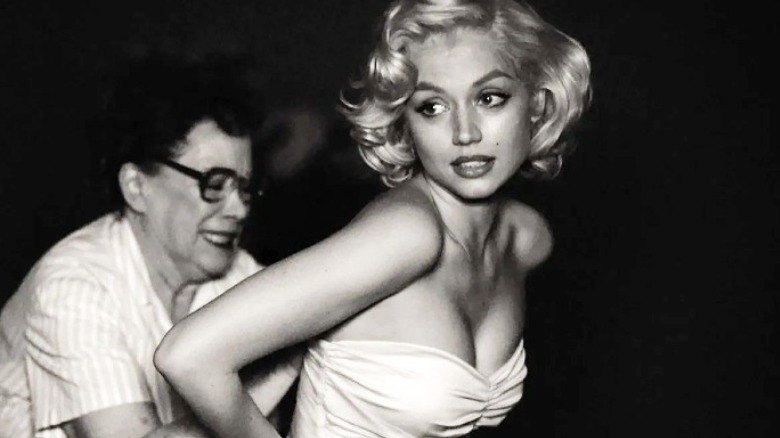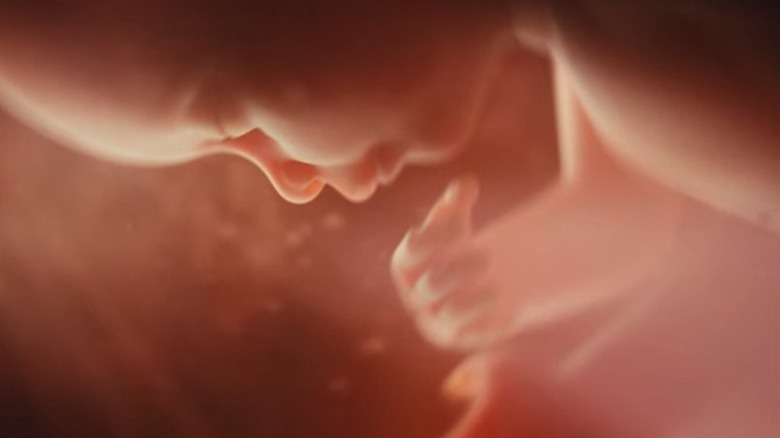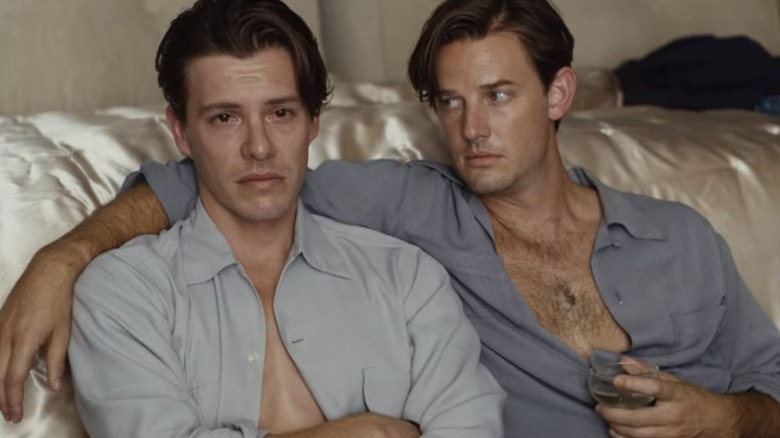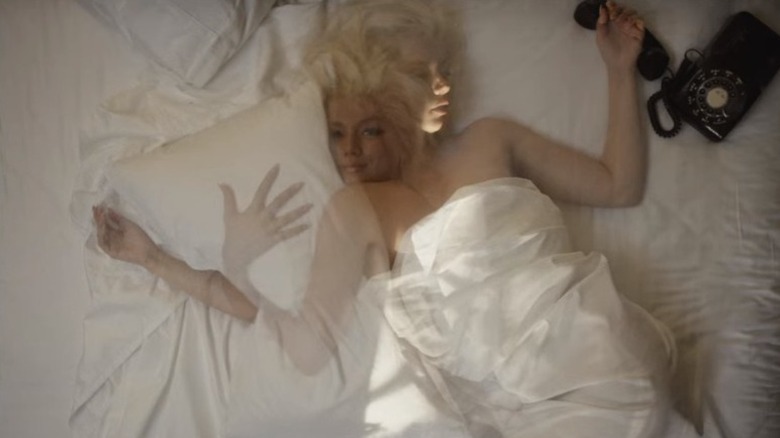The Ending Of Blonde Explained
Andrew Dominik's "Blonde" is less of a film than a nearly three-hour roller coaster ride, as if to simulate the "experience" of being Marilyn Monroe (Ana De Armas) on one of her worst days. Like the 700+ page Joyce Carol Oates novel that it's based on, "Blonde" plays fast and loose with history, and tells a jumbled story of how disorienting and exploitative its fictional Norma Jeane Baker (Monroe's original name) finds her journey to fame. It purposefully avoids the behind-the-scenes of Monroe's illustrious film career itself, and focuses on the more shocking things that made her such a tabloid sensation — in addition to making even more shocking things up.
It's much less the biography of one of cinema's greatest icons than it is an indictment — of the Hollywood machine, of the animalistic and ravenous public, of absent fathers and unfit mothers. It's also a little bit hard to follow in the way that it defies all narrative convention: after a few brief scenes of a troubled childhood, we join an already-glamourized Marilyn as she careens between powerful men and faceless studios like a pinball. In the cacophony of formal experimentation, brutal psychological horror, and disorienting sequences of alcohol and barbiturate use, it's easy to feel as confused as De Armas' poor Marilyn herself. Let's take a breath, and make the sense we can of a stunning and mesmerizing dark fable. This is the ending of "Blonde" explained.
That man is your father
"Blonde" ends as it began, with a glimpse of the mysterious man from the photograph that Norma's mother Gladys (Julianne Nicholson) claims is her father. Throughout all of Norma's life, the photograph and the idea of her father represents the empty promise of Hollywood. Her mother claims her father was a prominent actor, and Norma spends her life believing that he will appear one day to make everything okay. The movie traces a very direct line between her absent father and her child-like naivete as an adult, and her tendency to refer to her older husbands as "daddy" and defer to them as authority figures.
In the closing moments, as she overdoses on a combination of alcohol and drugs, Norma hears her mother's voice and sees the figure of her "father" surrounded by stars and the lights of fireworks. Her father, or at least Norma's idea of him, welcomes her to the afterlife. Just as he was a fable, a Hollywood concoction by Norma's unfit mother desperate for a way out, Norma has now passed from life into legend herself — she'll be forever Marilyn, a symbol in photos and movies as distant from the real Norma as she was from her father.
Marilyn Monroe as a construct
Although director Andrew Dominik is known for moody, somewhat experimental dramas like "The Assassination of Jesse James by the Coward Robert Ford" and "Killing Them Softly," nothing prepares you for the all-out assault on convention that is "Blonde." Other than roughly waltzing through Marilyn Monroe's life in vaguely chronological order, there is no trace of the normal beats of a biopic. There's no aspirational rising or precipitous falling from grace: "Blonde" is all anxiety and stress as Norma Jeane goes from a tormented childhood to a tormented showbiz career, and we never get a sense of her motivation to do so.
"Blonde" wants you to know that there was no real "Marilyn Monroe." It was a stage name created by a studio, and a completely fabricated image sold to us in pin up photos and tabloid headlines. Dominik's Marilyn is nearly always exquisitely made up to look like a glamorous photoshoot come to life: when she's briefly happy with Arthur Miller (Adrien Brody), they look right at the camera in a hazy montage. And despite her rigorous preparation, Ana de Armas' Cuban American accent inevitably pokes through during her otherwise thoroughly committed performance: even in the casting of Marilyn our attention is brought to the idea that we're not watching a real person, but a gauzy impression of a person's memory.
The fire in the Hollywood hills
The breaking point for young Norma Jeane's mother Gladys is a wild fire in the Hollywood hills. Drunk and manic, she tries to take Norma Jeane to see her alleged father, but is turned back by the police when she attempts to drive through the rampaging flames. Back at home, she snaps and attempts to drown Norma Jeane in the bath tub, resulting in Gladys' eventual commitment to a mental hospital and Norma's delivery to an orphanage.
When an adult Norma terminates her first pregnancy, it's implied to be partially due to fears that any child would inherit Gladys' mental instability. Norma has a vision during the procedure of a rampaging fire in their old house — the fire from that night has come to represent the risks of motherhood, as well as the ceaseless fire of the Hollywood system. Just as the dreams of uniting with her former lover drove Gladys over the edge, the desire to cross through the flames has been passed on to her daughter.
Norma Jeane vs. Marilyn
Rather than try to reconcile the ideas of Norma Jeane the real human with the persona of Marilyn Monroe, "Blonde" emphasizes again and again that they're at constant war with one another. Even the title of the movie is a reminder that Monroe's striking blonde hair was applied artificially. Watching herself on the screen at the "Gentlemen Prefer Blondes" premiere, Norma Jeane murmurs to herself, "That thing on the screen, it isn't me." As "Blonde" progresses, it plays increasingly like a horror movie, almost like a tale of demonic possession or a werewolf curse, as we mostly watch poor Norma Jeane deal with the fallout of decisions that Marilyn has made for her.
Do the men who take Norma Jeane to get an abortion really ignore her pleas to stop, or is it a representation of an internal war with herself? As her life spirals out of control, Norma desperately waits for Marilyn to "appear" and help her get through days when she's filming. Her makeup artist Whitey (Toby Huss) makes it explicit, promising, "I'm gonna conjure Marilyn within the hour." Like a nightmarish inversion of "Fight Club," "Blonde" proposes that the years of trauma, abuse, and exploitation by the system have caused Norma Jeane to dissociate almost entirely from Marilyn Monroe, and to spend most of her short life trying to be rid of her.
A scene with actual people
In both of her marriages, "Blonde" gives Norma Jeane rare moments of quiet to actually express herself and attempt to find stability and safety. It becomes clear in her discomfort that her troubled upbringing and traumatic experiences in Hollywood have left her so anxious that she scarcely knows how to function in ordinary life. When she spends time with Joe DiMaggio's (Bobby Canavale) extended family, she laments, "It's so scary how a scene with actual people just goes on and on ... Not like a script. There's no point. It just happens."
Even her version of escaping the impersonal Hollywood machine is to go to New York and try her hand at theater, to escape herself for even longer by inhabiting a character for as long as possible. Although she finds a brief idyllic moment with Arthur Miller, she's painfully afraid and paranoid that his friends don't like her when they come for a visit. When he convinces her to finally join them for a human moment on the beach, she trips and causes a miscarriage on the way, shattering her dreams of quiet domesticity once and for all.
The iconic subway grate image
"Blonde" goes all out to emphasize the reality-warping, surreal importance of the iconic image of Marilyn Monroe standing over the subway grate in "The Seven Year Itch." Marilyn's gleeful smile and billowing white skirt make for one of the most memorable images in more than a century of cinema, and one of the most-paused movie moments of all time. "Blonde" cuts together a montage of the filming of the scene with the studio's recreation of it as a publicity stunt in front of thousands of onlookers. Time distorts and the camera leers uncomfortably, as in one iconic pose Norma Jeane is transformed from a person to a commodity, an enduring token of weaponized sex appeal.
The ghost of this moment will haunt Norma Jeane for the rest of her life. Joe DiMaggio, already possessive and abusive, flies into a rage afterwards and beats her — their divorce follows not long after. But even when Norma Jeane and Arthur Miller meet and make a rare intellectual connection, as soon as he turns the corner on his way home he sees a giant advertisement for "The Seven Year Itch" with a two-story tall Marilyn. Her status as a cultural icon and sex symbol is now something impossible for her to escape.
Who told you that?
In the warped reality of "Blonde," Norma Jeane is so thoroughly and ubiquitously objectified that men are often surprised she can think. Arthur Miller is initially very condescending and skeptical when she compares the title character of his play "Magda" to a character in Anton Checkov's "Three Sisters." In one of the movie's rare moments of human connection, his initial chauvinism soon gives way to awe-struck tears when Norma Jeane makes another observation about the character's illiteracy that hadn't even occurred to him, the playwright. Though his attitude toward her is still paternalistic, he's the rare character who appears to respect her mind.
As her life deteriorates years later, Norma Jeane clings to the idea that she has something more to offer than her body. "It isn't sexual, between the president and me," she murmurs to the grim-faced Secret Service agents who pick her up in 1962, just before they literally pick her up and carry her "like meat" to a waiting JFK (Caspar Phillipson, who also played the former President in "Jackie"), who doesn't even bother to get off the phone. In the most callously explicit part of the movie (likely the scene most responsible for the NC-17 rating), it's clear that the President (and by extension, America) considers Norma Jeane nothing more than a body.
The madness of crowds
A grueling slow-motion sequence at the premiere of "Some Like It Hot" late in "Blonde" underscores Norma Jeane's growing detachment from reality, as well as the pressures and nightmarish attention of fame. As she makes her way into the theater, the faces of the predominantly male crowd are slightly distorted with CGI to appear with huge mouths. The men all appear to be a whole lot angrier than they are star struck, giving the whole scene a confrontational and unsettling vibe.
Somewhat oblivious and definitely intoxicated for the occasion, Norma Jeane in full "Marilyn" mode tells the crowd she loves them. With her personal life in shambles, she's resigned to giving the people what they want, even if they're a demonic rabble that are on a quest to devour her whole. "Blonde" never misses a chance to make the subtext of the story into stomach-churning text.
Selective misery
"Blonde" is tantamount to a piece of fan fiction, as is the novel its based on. Neither makes any pretense about accurately reflecting the real Norma Jeane's life. But the key to understanding "Blonde" is that it goes out of its way to be a pastiche of all the worst moments possible. Outside of brief sequences at movie premieres, it doesn't spend much time on the movies that made Marilyn Monroe famous, or the comedic timing and charm that made her so unforgettable on screen. It specifically includes a phone call where she learns she's vastly underpaid compared to her male co-star, but makes no mention of her subsequently founding her own production company and commanding much more money and creative control (via Entertainment Weekly).
Given the way that it's polarized critics and fans so far, "Blonde" is perhaps designed to punish the audience for going in expecting anything glamorous or appealing whatsoever. It creates a vivid, fantastic experience with a lot of realistic period detail and indelible imagery, but it does so exclusively to drive home the dehumanizing effects of stardom and exploitation. Whether that crosses the line into contempt for the viewer is in the eye of the beholder, but it's clear that "Blonde" and Andrew Dominik have no interest in tempering the harrowing nature of the story by letting us share in any of Norma Jeane's happier moments.
Norma's doomed quest for motherhood
Motherhood becomes the prevailing theme of Norma Jeane's personal ambitions in "Blonde." We never get a sense of what Hollywood stardom adds to her life, but we are constantly reminded of what it precludes. "For this, I gave up my baby?" Norma wonders in disbelief at the premiere of "Gentlemen Prefer Blondes." After a miscarriage during her marriage to Arthur Miller, she seemingly takes it a sign she's fundamentally not meant for domestic tranquility, and pivots back to the Hollywood life of inebriated celebrity.
In a final and gruesome invention, "Blonde" has agents of the President abscond a delirious Norma Jeane and have her undergo another procedure when she's apparently pregnant with the child of the leader of the free world. In each of these sequences, the movie zooms into show the fetus in the womb, an inverse echo of the Star Child from "2001: A Space Odyssey," and one of them even talks to her and pleads with her to keep it. Effectively an orphan herself, Norma Jeane is defined by her inability to bring a child into the world to call her own. In the final moments of her life she receives a plush tiger toy in the mail that reminds her of this ongoing emptiness.
There never was a tearful father
The final moments of "Blonde" have the only thing you could describe as a plot twist, but it's a doozy. After the death of her former lover Cass (Xavier Samuel), Norma Jeane receives a package that contains a memento as well as a note from Cass, who reveals that he had been writing the letters from her "father" that she'd been receiving for years. Why Cass would deceive Norma Jeane like that isn't made clear (especially why his letter about "The Seven Year Itch" would be so judgmental and moralizing), but the deception on top of the grief is too much for her to bear.
The brief time that Norma Jeane is in a throuple with Cass and Eddy (Evan Williams) early in the movie is the last time she's able to be her true, non-Marilyn self. Alone, miserable, and spiraling into addiction and malaise, she receives a package that's a perfect storm of tragic mementos: it's from her dead lover, and it contains the plush tiger reminder of her lost childhood (and lack of a child), along with the note revealing her mythical father will never appear.
The final shot
After taking a lethal combination of alcohol and pills, Norma Jeane stumbles to bed for the final time. In a final surrealistic touch, Andrew Dominick superimposes a shot of a smiling Norma Jeane in "Marilyn" pin-up mode hugging her pillow over the image of Norma Jeane's lifeless body. In the moment of her death, she's transcended reality to become the Marilyn Monroe captured on celluloid and immortalized in Andy Warhol prints. After an all-too-short life, she's become a legend that will last decades, if not centuries.
In a sequence that deliberately recalls David Lynch's "The Elephant Man," the camera moves across the room and the credits eventually zoom all the way to the stars. After three hours of degradation, exploitation, and commodification, "Blonde" releases us with a soaring sense of the eternal star power of the mythical figure for whom it's attempted to submerge us in empathy. It's a cathartic release, both for Norma Jeane and an audience weary of watching her suffer.
